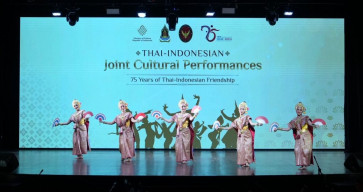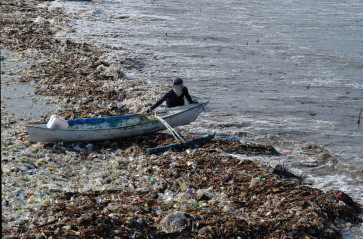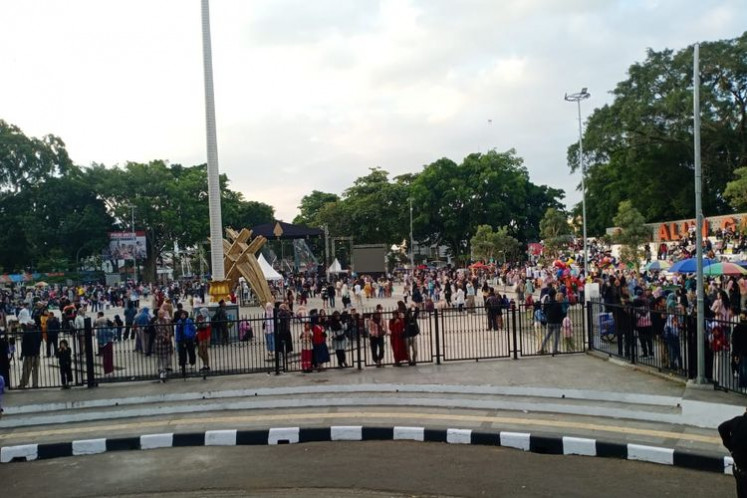Popular Reads
Top Results
Can't find what you're looking for?
View all search resultsPopular Reads
Top Results
Can't find what you're looking for?
View all search resultsConstitutional amendment in the works
Calling the shots: Leaders of the Peopleâs Consultative Assembly (MPR) preside a meeting attended by members of the House of Representatives and the Regional Representatives Council (DPD) at the MPRâs headquarters in South Jakarta on Oct
Change text size
Gift Premium Articles
to Anyone
 Calling the shots: Leaders of the Peopleâs Consultative Assembly (MPR) preside a meeting attended by members of the House of Representatives and the Regional Representatives Council (DPD) at the MPRâs headquarters in South Jakarta on Oct. 7, 2014. The MPR is working to amend the 1945 Constitution for the fifth time.(JP/Awo) (MPR) preside a meeting attended by members of the House of Representatives and the Regional Representatives Council (DPD) at the MPRâs headquarters in South Jakarta on Oct. 7, 2014. The MPR is working to amend the 1945 Constitution for the fifth time.(JP/Awo)
Calling the shots: Leaders of the Peopleâs Consultative Assembly (MPR) preside a meeting attended by members of the House of Representatives and the Regional Representatives Council (DPD) at the MPRâs headquarters in South Jakarta on Oct. 7, 2014. The MPR is working to amend the 1945 Constitution for the fifth time.(JP/Awo) (MPR) preside a meeting attended by members of the House of Representatives and the Regional Representatives Council (DPD) at the MPRâs headquarters in South Jakarta on Oct. 7, 2014. The MPR is working to amend the 1945 Constitution for the fifth time.(JP/Awo)
C
span class="caption">Calling the shots: Leaders of the People's Consultative Assembly (MPR) preside a meeting attended by members of the House of Representatives and the Regional Representatives Council (DPD) at the MPR's headquarters in South Jakarta on Oct. 7, 2014. The MPR is working to amend the 1945 Constitution for the fifth time. (JP/Awo)
Indonesia is gearing up for the fifth amendment to the 1945 Constitution, spearheaded by the Regional Representatives Council (DPD), as a follow-up to the People's Consultative Assembly (MPR) decree suggesting reinforcement, particularly in judicial supervision and the political system.
Earlier this month, DPD leaders met President Joko 'Jokowi' Widodo at the Presidential Palace to seek support for the amendment.
Law and Human Rights Minister Yasonna H. Laoly said while the government would support the proposal, it would not overstep the authority of the MPR in deciding the future of the proposal, as the government had no authority to deliberate it.
'As for now, we are waiting for the House to follow up on the DPD's amendment proposal,' he said.
As the sole institution responsible for changes to the Constitution, the MPR's 692 members consist of 560 House of Representatives members and 132 DPD members.
Progress with the amendment is likely to be sluggish as there are signs that political parties are reluctant to share power with the DPD in law deliberations and state budget supervisions in the upcoming amendment proposals.
Many DPD members have vented their frustration that the institution is unable to influence crucial government policies; some DPD members prefer to join political parties to help advance the amendment.
After getting elected as a DPD member in 2009, Erma Suryani Ranik realized that she had limited policy-making authority.
Representing the West Kalimantan province, the activist-turned-politician argued that it had been very difficult for her to contribute to the development of her region since DPD members, unlike their colleagues in the House of Representatives, had no authority to pass bills or intervene in the government's budgeting rights.
In an attempt to gain broader lawmaking authority, Erma finally decided in 2013 to sign up as a candidate to become a lawmaker for the Democratic Party, then the country's largest party, and she later won a seat in the House in last year's legislative election.
'I was so concerned about the DPD's limited lawmaking powers that I didn't think about staying there for another five-year term,' Erma, now a member of the House's Commission III overseeing legal affairs, said recently.
The DPD, which currently houses 132 independent figures representing 33 provinces, was established in 2004 following the introduction of a bicameral representation system as a result of earlier amendments to the country's 1945 Constitution.
The amendments, carried out by the People's Consultative Assembly (MPR) four times between 1999 and 2002, were aimed at overhauling the constitutional system after the fall of president Soeharto's authoritarian regime in 1998. The MPR is the only state body authorized to amend the Constitution, or to impeach the president based on a request from the House.

However, unlike the typical two-house system in many other countries, the Indonesian version of bicameralism does not position the DPD and the House, both of which jointly form the MPR, on an equal footing.
That is because the Constitution only grants lawmaking and budgeting supervision authority to the House, pushing DPD members to run a long standing campaign for a stronger legislative authority through another Constitutional amendment.
To pave the way for the Constitution amendment, the DPD must garner support from at least one-third of the MPR. Meanwhile, the endorsement for an amended Constitution will require support from half the MPR members plus one.
Most House members, however, have shown reluctance to collectively approve the DPD's demand, sparking an accusation that they, with support from their respective political parties, have never been interested in sharing their lawmaking authority with DPD members.
Following the rejection of the amendment, at least a dozen DPD members in the 2009-2014 period, including Erma and former deputy speaker La Ode Ida, decided to jump ship to political parties and run as lawmaker candidates in the 2014 legislative elections. Several others, meanwhile, resigned before their tenure ended to compete in regional head elections.
Last year, after intensive political lobbying, the MPR finally agreed to issue an internal decree recommending, among other things, the reorganization of the constitutional system.
The internal decree, issued just days before the end of the MPR's previous term, suggests eight areas for reforms that include reinforcement of the presidential system, the DPD, the Constitutional Court, the Supreme Court and the Judicial Commission.
Although the internal decree does not specifically mention when the fifth Constitutional amendment must be made, DPD Speaker Irman Gusman said he considered the decree a landmark achievement, as it provided the current MPR members with a common platform to initiate the fifth constitutional amendment.
'What the MPR needs to do now is formulate a draft amendment with details that can be fully supported by all MPR factions,' Irman told The Jakarta Post in a recent interview.
Irman, who secured his second leadership term last year, also quickly turned down accusations suggesting that the DPD's lawmaking authority, if approved during the amendment, would slow down the performance of the government as the President would need to lobby the House and the DPD to approve its planned policies.
'To reinforce our presidential system of government, the House and the DPD must jointly control the lawmaking authority while the President is granted rights to propose bills and veto [laws].'
'This system will let any lawmaking debate stay between the House and the DPD so that the President will be able to focus on conducting his job as the state's chief executive,' said Irman.
Despite their support of the MPR's call for constitutional reform, factions from political parties in the MPR, however, have shared different opinions on how the recommendation should be implemented.
In a recent hearing with the DPD, Indonesian Democratic Party of Struggle (PDI-P) lawmaker Ahmad Basarah, who leads the PDI-P faction in the MPR, for example, insisted that all factions must first agree whether they would reform all areas suggested by the MPR's internal decree, or select several of the points.
Ahmad also stressed that any constitutional amendment proposal must be submitted during a peaceful political atmosphere to avoid conflicts of interest among political elites.
'Since the MPR is still discussing this amendment proposal, I'm requesting all factions and the DPD to uphold our institutional ethics by not publicly announcing that it is certain that the MPR will carry out the amendment,' he said.
Unlike the PDI-P, the Golkar Party, the country's second largest political party and the leader of the opposition coalition, has urged the MPR to immediately set the deadline for the completion of the next constitutional amendment.
Golkar, according to the head of its faction in the MPR, Rambe Kamarul Zaman, has considered the importance of granting DPD members a broader legislative role as a way to give them more room to voice regional interests.
'Looking at the current implementation of the Constitution, Golkar has considered that we have been employing none other than a soft bicameral system. It is necessary, therefore, to give the DPD more of a legislative role to strategically improve the system,' he said.
Constitutional law expert Irman Putra Sidin of Hasanuddin University, meanwhile, urged the MPR to prioritize the amendment, arguing that the loopholes in the current constitutional system had inevitably created conflicts and overlapping authority among state institutions.
Irman, however, realized that the conflicting interests of political parties would not make the efforts to overhaul the constitutional system easy.
'In the end, the amendment must follow a certain, complicated political process. However, an attempt to reform the system should continuously be taken to respond to political changes or any other challenges,' he said.










